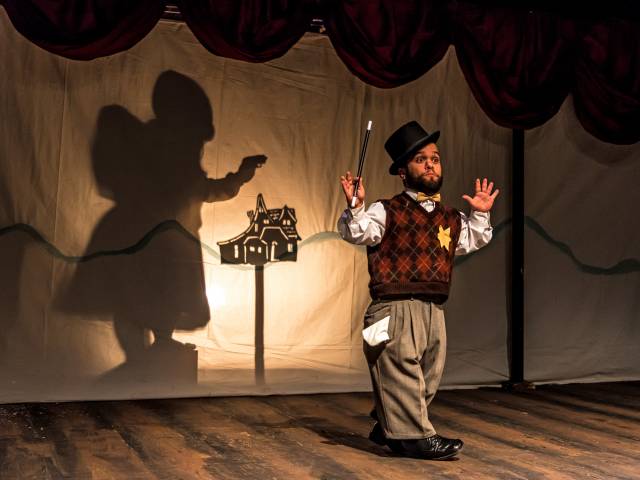

Upon the death in 1923 of their rabbi father who was a dwarf, seven of the ten children of Shimson Eizik Ovitz formed a theatrical ensemble known as the Lilliput Troupe. Being Romanian, these seven children of Ovitz, also dwarves, toured across Romania, Czechoslovakia and Hungary during the '30s and early '40s, playing small instruments and singing in Yiddish, Romanian, Hungarian, Russian and German. Though they had acquired papers that hid their Jewish identities, on May 12, 1944 the Ovitzes were detained and taken to Auschwitz where they fell into the hands of the notorious Nazi doctor Josef Mengele, otherwise known as the Angel of Death. Because of their dwarfism, Mengele experimented on them in various abominable ways, claiming it to be research. The Ovitzes became the largest family to survive Auschwitz intact.
The Lilliput Troupe, written by Gaby FeBland and directed by Alex Benjamin, tells the story of the Ovitzes through the vehicle of vaudeville by blending their story into the story of the seven dwarves who were the companions of Snow White. Infused into this are klezmer music, comedy, and shadow puppetry, which structurally provide for an acute boring into the emotional core of this tale by costuming that core. Attached to this fusion is also the suggestion of the Chaplinesque notion that comedy and tragedy are quite closely linked indeed. Comedy may allow us to safely explore the tragic, and it may also serve as a source of redemption and grace against tragedy.
The Lilliput Troupe is well set up in this way, but it doesn’t quite come together in the end. Much of it, perhaps uncertainly caught between the horror and the humor, comes out flat in the presentation and it lacks the sort of spearhead (see Chaplin’s final speech in The Great Dictator for a perfect example of this cohesive fixture) that would join it all in an ultimate emotional point. Against this awkwardness, when it occurs, one wishes for a more straightforward telling of the Ovitzes’ tale, the facts of which are fully pregnant with emotional resonance as they are.
The most interesting part of The Lilliput Troupe is that it illustrates well the various personalities of the Ovitz family and how they dealt with the nightmare through which they lived, with particular notice to Perla, the youngest Ovitz, who developed a strange relationship with Mengele, whom she called “Uncle” and with whom she credited the survival of her family and her. The retrospective framework of this play allows nicely for a removed and oblique inspection of these kinds of psychological moods that could not fairly have any kind of biased judgment placed upon them.